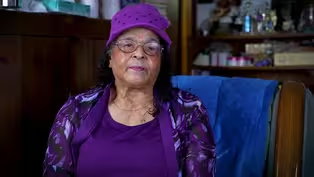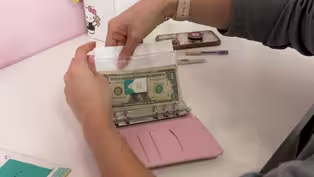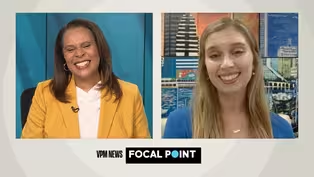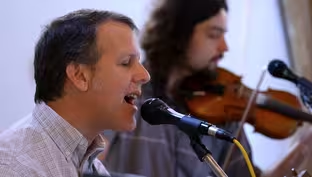VPM News Focal Point
About nine percent of Virginians deal with medical debt
Clip: Season 3 Episode 6 | 4m 41sVideo has Closed Captions
More than half a million Virginians have medical debt, which can lead to bankruptcy.
Medical debt can have a disastrous effect on a person’s finances and can lead to bankruptcy. These difficulties add additional stress for those dealing with health issues. We learn about two Richmond non-profits that offer solutions to help those struggling with medical debt – Neighborhood Resource Center and CancerLINC.
Problems playing video? | Closed Captioning Feedback
Problems playing video? | Closed Captioning Feedback
VPM News Focal Point is a local public television program presented by VPM
The Estate of Mrs. Ann Lee Saunders Brown
VPM News Focal Point
About nine percent of Virginians deal with medical debt
Clip: Season 3 Episode 6 | 4m 41sVideo has Closed Captions
Medical debt can have a disastrous effect on a person’s finances and can lead to bankruptcy. These difficulties add additional stress for those dealing with health issues. We learn about two Richmond non-profits that offer solutions to help those struggling with medical debt – Neighborhood Resource Center and CancerLINC.
Problems playing video? | Closed Captioning Feedback
How to Watch VPM News Focal Point
VPM News Focal Point is available to stream on pbs.org and the free PBS App, available on iPhone, Apple TV, Android TV, Android smartphones, Amazon Fire TV, Amazon Fire Tablet, Roku, Samsung Smart TV, and Vizio.
Providing Support for PBS.org
Learn Moreabout PBS online sponsorshipBREANNE ARMBRUST: This is our large meeting room.
BILLY SHIELDS: Breanne Armbrust is the executive director of the Neighborhood Resource Center inside this small storefront in the Fulton area of Richmond.
Its members often come to the organization in dire need.
BREANNE ARMBRUST: We have a computer lab that we use for individuals to apply for positions and...
Many of our members end up going to the emergency room for their typical care because they may not have a primary care provider.
Most of our members come to us uninsured.
BILLY SHIELDS: She remembers one member who had mounting medical debt which may have contributed to even more health issues.
BREANNE ARMBRUST: They had already been approved for the bankruptcy, and were in the bankruptcy process of paying down, you know, their debt with an agreement.
That individual over the course of the first few months that I was working with them, experienced a heart attack.
BILLY SHIELDS: It's something that creates an all-too-familiar problem, the problem of medical debt.
BREANNE ARMBRUST: Thinking ahead to think that in some point in the future I may have a medical catastrophe is, you know, something that I do think our members do, but it's a choice between paying for health insurance for something that might happen or paying for your rent or buying food.
LAURA ALRIDGE: I would say the majority of our clients do have medical debt.
It's something that we see frequently, and it is one of the leading causes, if not the most leading cause, of people filing for bankruptcy.
BILLY SHIELDS: Laura Alridge is a bankruptcy lawyer at the Boleman Firm in Richmond.
She says many different life events can precipitate a health emergency that takes someone over the edge.
LAURA ALRIDGE: It can also be the loss of employment or the breakup of a family unit, but certainly medical debt plays a very, very large role, and sometimes what people do is they start paying the medical debt with their credit cards.
BILLY SHIELDS: Bankruptcy is the most common legal remedy.
Alridge volunteers her time providing pro bono legal assistance for CancerLINC, a Richmond nonprofit that helps people with the financial repercussions of a cancer diagnosis.
CHRIS WILLIAMS: One example may be someone who's working an hourly labor job who tells their employer that they need to take time off for treatments, and after they do that for a certain amount of time, many times we'll have an employer who then tells that employee, "Well, you need to resign because we can no longer allow you to take time off," and generally, of course, those folks, when they're not on the job, they're not being paid, so debt happens there and then they lose their job, so they have no income.
BILLY SHIELDS: Chris Williams remembers having a migrant man approach him for help.
CHRIS WILLIAMS: And went to the hospital and was diagnosed with malignant cancer, brain cancer, and his decision immediately was to not be treated for that cancer because he knew the financial effects that he would leave for his wife and child, and that just, it tore me up.
BILLY SHIELDS: Armbrust was part of an innovative solution to medical debt.
BREANNE ARMBRUST: Last year, we participated in an effort with an organization called RIP Medical Debt, and they purchased, they're a nonprofit that purchases debt portfolios of medical debt, and then they abolish it.
BILLY SHIELDS: She knows this situation all too well.
She says she was lucky to have insurance that spared her from taking on medical debt.
BREANNE ARMBRUST: I've experienced that.
I was privileged when I was younger to work in environments where I had very, very good healthcare, and so when I experienced a brain tumor that I had to have surgery for, I had to have two brain surgeries over the course of five years, and the last one resulted in a stroke.
When I added up all of those medical bills, it would've been over $2 million for me out of pocket if I didn't have the health insurance that I had.
Even for people that have private health insurance, we have a system that is damaged.
BILLY SHIELDS: So, what can be done to address this?
LAURA ALRIDGE: Obviously, the system is broken.
BILLY SHIELDS: Alridge and Armbrust both use different means to help people facing medical debt.
Whether out of a Northside law firm or in Fulton Bottom, both women say suffering from chronic debt should not be an affliction of its own.
For VPM News, I'm Billy Shields.
Mounting college debt weighs heavily on borrowers
Video has Closed Captions
Clip: S3 Ep6 | 7m 42s | More than 1 million Virginians owe student loan debt, which can linger for decades. (7m 42s)
Virginia woman cuts debt by cash stuffing
Video has Closed Captions
Clip: S3 Ep6 | 2m 7s | What is cash stuffing? A TikTok trend helped a Virginia woman cut down her college debt. (2m 7s)
How community could help you tackle debt
Video has Closed Captions
Clip: S3 Ep6 | 9m 6s | JMU graduate says finding the right community helped her pay off $60,000 college debt. (9m 6s)
Small church helps pay debts of neighbors
Video has Closed Captions
Clip: S3 Ep6 | 3m 12s | Churches working together raise enough to wipe out nearly two million in medical debt (3m 12s)
Providing Support for PBS.org
Learn Moreabout PBS online sponsorship
- News and Public Affairs

Top journalists deliver compelling original analysis of the hour's headlines.

- News and Public Affairs

FRONTLINE is investigative journalism that questions, explains and changes our world.












Support for PBS provided by:
VPM News Focal Point is a local public television program presented by VPM
The Estate of Mrs. Ann Lee Saunders Brown



